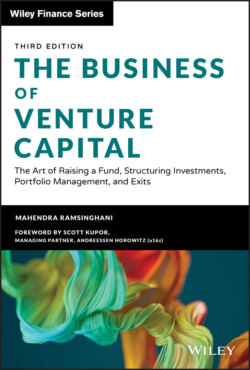Читать книгу The Business of Venture Capital - Mahendra Ramsinghani - Страница 41
Moon Shots in Emerging Technology — Bets in Quantum Computing
ОглавлениеThe arc of Andrew Schoen's VC career begins with Sid, where he founded the Cornell University's Venture Club to gain exposure to the world of venture capital. Young MBA students could work alongside seasoned investors and learn the craft, hone their skills. As Andrew and Sid built the club, they engaged with leading firms such as Sequoia, Bessemer, and others who came in to work on projects with the students. With the ringside view of the venture world, both of them were able to find an entry point.
Soon after graduation Andrew, who has spent five years at the multibillion-dollar venture firm New Enterprise Associates (NEA), moved to Beijing, China, for three years. There, he was able to build out the portfolio and subsequently moved to New York, where he set up the firm's East Coast offices. “The job of a venture capitalist is to identify and invest in opportunities with immense potential — ours is distinctly a mission of value creation (as opposed to value capture). We foster innovation that occurs in leaps and bounds, with progress that looks more like a step-function graph than a straight line,” he writes.2 One of the companies Andrew led an investment in is a category defining opportunity in quantum computing. With the end of Moore's law in sight, we need a punctuation mark in the path of semiconductor development. For Andrew, this is a moon shot, but as a first mover, he was able to study the entire landscape of opportunities in quantum computing and make a bet on an opportunity that has significant potential.
For him, it's not the risk that matters but the scale of the outcome. As he muses:
For investors who are able to lean in with their eyes wide open and fully understand the bet, an investment in quantum computing could be a moon shot worth taking. A moon shot can go awry. But venture capitalists make moon shot investments when they are convinced that the potential rewards outweigh the risks. The question is not whether investments will be made in quantum computing. Multiple governments around the world, and multiple government agencies domestically, are already directing funds and technical efforts toward this challenge. Several private investments have already been made in the field. The question is whether the rewards will be worth the financial risk, and the wait.
